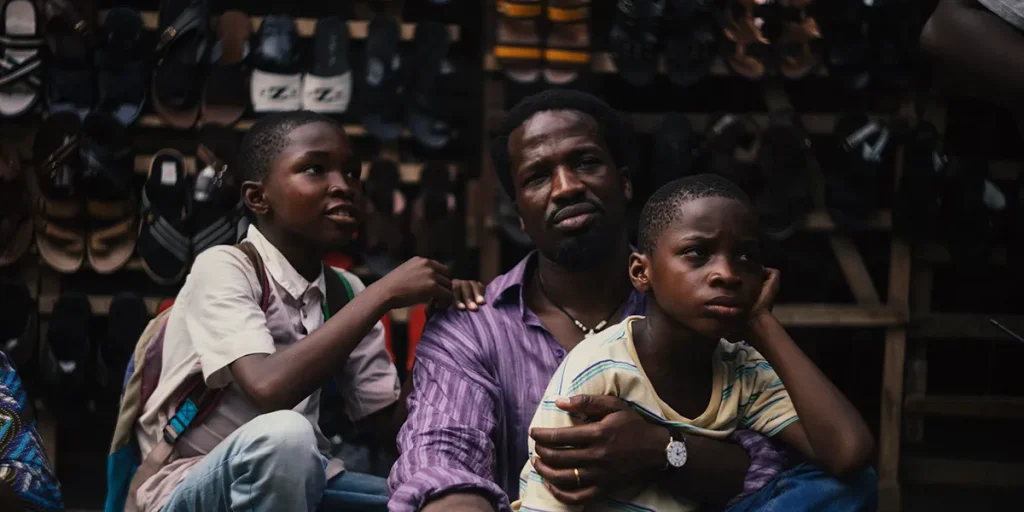My Father’s Shadow, the directorial debut from Akinola Davies Jr., is an intriguing and poetic tale of two youngsters spending a day with their elusive father.
Director: Akinola Davies Jr.
Genre: Drama
Run Time: 94′
BFI London Film Festival Screening: October 17-18, 2025
Release Date: February 6, 2026
Where to Watch: In U.S. theaters, in U.K. & Irish cinemas, and globally in theaters
Worldbuilding is a difficult task in any film, perhaps even more so when depicting a true-to-life world rooted in realism and history, as opposed to a far-flung universe where writers’ imaginations can be let loose. It is also a vital aspect of films. My Father’s Shadow is one of the most impressive depictions of a particular country and society put to screen this year, so frequently tangible that you can feel the heat of the sun and the buzz of the busy Lagos streets.
The world feeds into the story of its three main characters—a father and his two sons—to create a deeply personal, surprisingly enigmatic, and moving tale that is told with amazing clarity by Akinola Davies Jr.
Two young boys, aged eight and eleven, sit outside their house in rural Nigeria. Older brother Remi and his sibling Aki are brought to life by actual brothers Chibuike Marvelous and Godwin Egbo. The chemistry flows freely between the two youngsters; their mother has gone to the village, and they’re bored, bickering to pass the time. A breeze picks up, CJ Mirra (Layla) and Duval Timothy’s dissonant original score echoes through the air, and the brothers’ attention is suddenly captured by something. In their parents’ bedroom is their father, Folarin (Sope Dírísù, His House, Gangs of London), who appears seemingly out of nowhere. Because Folarin is regularly away for work, his relationship with Remi and Akin is complex and mysterious, so when he invites them to join him on a day-trip to Lagos, their excitement is palpable.
Set against the political upheaval of the 1993 Nigerian election, My Father’s Shadow is beautifully enigmatic. Information is drip-fed to us via headlines and radio snippets, and often viewed through the childlike, innocent eyes of Remi and Aki. This organic structure works wonders in crafting a vivid world where political fervour has gripped a nation. The details are immense; the terrific sets captured with a grainy realism by DOP Jermaine Edwards (Ish). And because much of My Father’s Shadow is relayed through the eyes of two youngsters, certain information—both about the country as a whole and regarding Folarin—remains mysterious or warped.
Because as much as My Father’s Shadow is about the political unrest of its setting, it is also a remarkably personal account of fatherhood, inspired by the experiences of co-writers Akinola Davies Jr. and Wale Davies, who lost their father at a young age. The enigma of Folarin is reflected in the story itself. As a trio, Dírísù and the Egbo brothers are faultless. The former captures the complexity of his character perfectly, simultaneously bringing an unknowability alongside a deep familiarity. He is imposing but warm, a commanding presence that bristles with pain and kindness. Chibuike Marvelous and Godwin are just as impressive as Dírísu. Their performances aren’t solely built by their strong chemistry, but by individual brilliance too. Both show tremendous talents for capturing the undulating emotions of young children in such a volatile environment.
My Father’s Shadow is a bit less sure-footed on the plotting of its story, although the enigmatic qualities are reflective of the young viewpoint from which we’re seeing the events. It can sometimes be too loose, though, with a small section in the middle of the story notably losing focus. At other times, the film’s artistic sensibilities threaten to dilute the story’s impact. Overall, however, My Father’s Shadow is a wildly impressive directorial debut from Davies, and a fascinating recollection of childhood memories that burn with adult themes.
My Father’s Shadow: Movie Plot & Recap
Synopsis:
Young brothers Remi and Aki accompany their father, Folarin, for the day on a trip to Lagos. Along the way, they learn more about one another whilst also experiencing the political crisis happening in 1990s Nigeria.
Pros:
- A trio of stunning performances
- A branching script of mystery and emotion
- Immense worldbuilding of great detail
Cons:
- Some looseness to the structure almost lessens the film’s impact
My Father’s Shadow was screened at the BFI London Film Festival on 17-18 October, 2025. The film was released in select U.S. theaters, in U.K. and Irish cinemas and globally in theatres on February 6, 2026.

